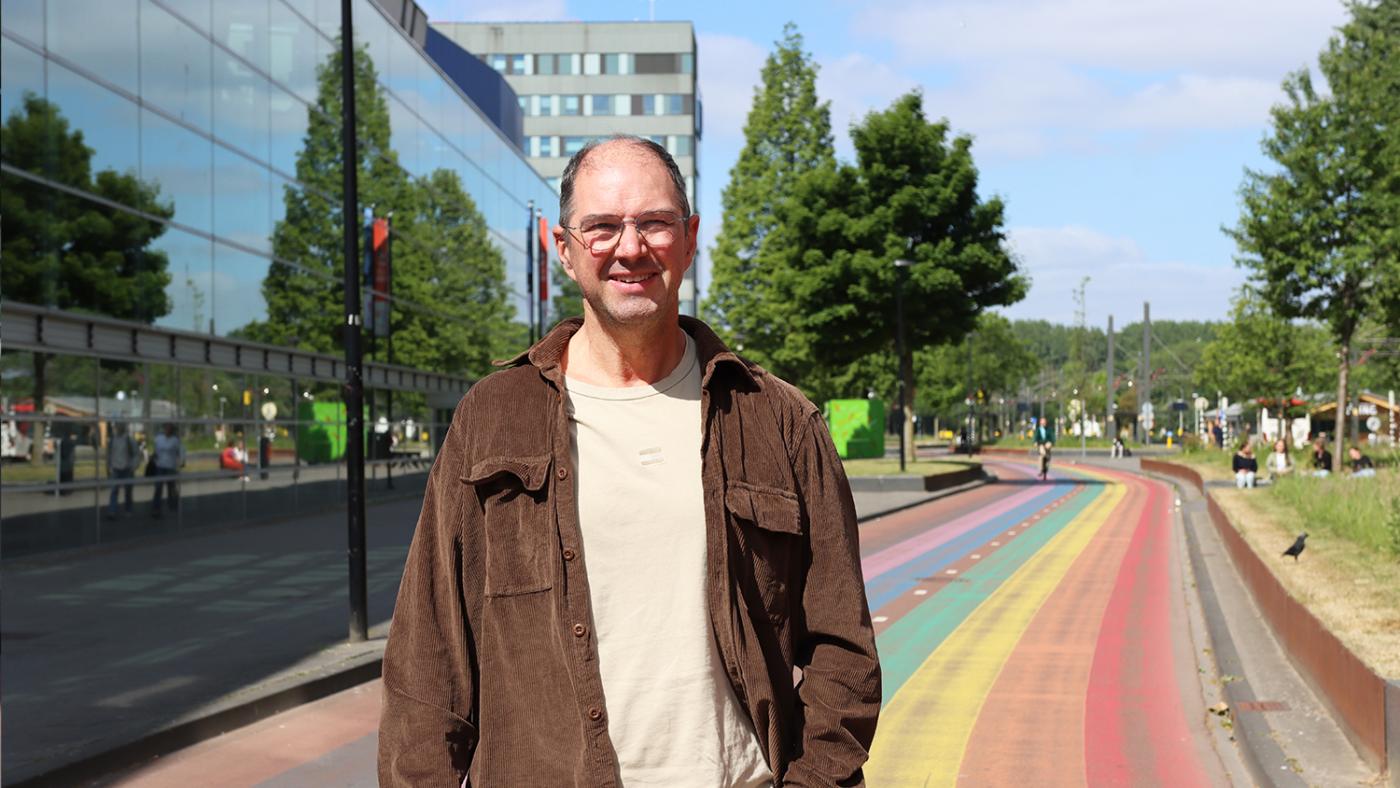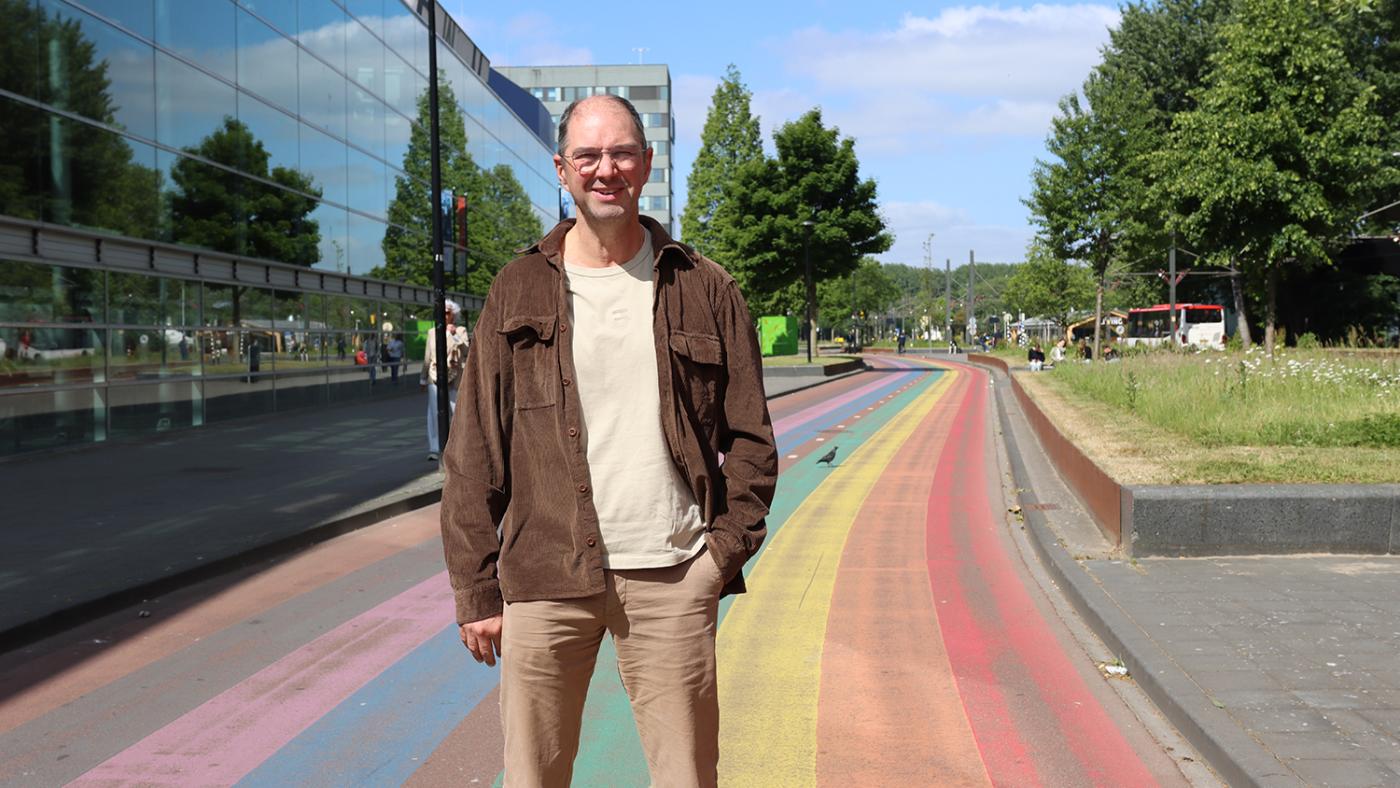John de Wit comments the end of the EDI programme:
‘The risk is that we no longer see EDI as a priority, but as something extra’

Utrecht Science Park has the world's largest rainbow-coloured bicycle path, students and staff can change their pronouns on Teams, and soon they will be able to register as non-binary as well. In addition, all university buildings are now equipped with all-gender toilets.
These are just a few of the many initiatives of the Equality, Diversity & Inclusion (EDI) programme, which aims to ensure that everyone feels welcome and safe at the university. The EDI programme also sought to address gender inequality in the workplace and attract more Dutch people with a migrant background to the university.
And they have been successful. The number of women working as associate professors and professors at Utrecht University has increased in recent years. The university aimed for 40 percent of its associate professors and 35 percent of professors to be women, and these percentages have been achieved. Additional positions have also been created for PhD students with a migration background. A quiet room has been set up in every region.
The Equality, Diversity & Inclusion (EDI) programme was established in 2021 to promote initiatives, activities and policies in the field of diversity and inclusion. John de Wit, a professor of Interdisciplinary Social Science who focuses on Public Health, has been the dean for EDI since 2023. Emeritus professor Janneke Plantenga had been in charge since the programme was established. The EDI programme ended on 1 January 2025, so there is no longer a separate EDI office. Utrecht University (UU) now wants EDI to be integrated into (with Solis ID) the organisation as a whole.
What are you most proud of?
"The most important thing for me is that EDI is on the agenda and has become a matter of course for most people. So many people were interested in attending the EDI festival we organised last autumn. The 250 spots were filled in no time. That's when I realised that a real movement has emerged. People sometimes have reservations about what EDI does, such as the rainbow-coloured bicycle path. Critics said it was just a symbolic measure. Nevertheless, I see it as a success because the topic is being discussed, and people are paying attention to it. Many people take pictures of the cycle path."
How do you feel about the EDI programme being discontinued and integrated into the organisation?
“It's a bit procedural: we have a programme with an end date, and after that it will be embedded. I endorse the idea that forms of policy should become part of the existing organisation, but at the same time, this carries the risk of making policy uncertain. We should think about how the university's key priorities will remain visible. This applies not only to EDI, but also to other programmes at the university, such as Continuing Education, Interdisciplinary Education and Community Engaged Learning. “By embedding programmes, we run the risk that the themes they focus on will no longer be seen as priorities for the university, but rather as something extra that people must do on top of their already busy schedules, at a time when budget cuts are necessary.”

What should UU focus on?
"I think we should become a more colourful university, both culturally and ethnically diverse. We are mostly white and middle-class at the university right now. Diversity is also about supporting first-generation students whose parents did not get to go to university. But those students can come from different social classes. One comes from a working-class background, while the other comes from a family with more disposable income.
So, we need to ensure that social class remains an issue. I sometimes find it difficult to make that distinction, as I don't want students to be judged on that. At the same time, we want to support those who need it. Ethnic diversity is also often linked to social class. The grandchildren of migrant workers are more likely to be first-generation students."
You had the wind in your sails when you launched the EDI programme. Now, resistance is becoming more visible. How are you dealing with that?
We are seeing a counter-movement emerging. I think that's a relevant development in a democratic society. People who think differently must remind us that they are there too. It keeps us aware that some advancements are not self-evident to everyone and that we must continue to make an effort to include everyone.
We shouldn't be too alarmed by this backlash, nor should we let it provoke us, as you can quickly end up in a conflict. That's usually not the quickest way to a solution because people dig in their heels. Let's try to listen to people with different perspectives and get them involved. In my optimism, I see the current resistance as a temporary dip, part of a pendulum swing."
Aren't you worried about it?
"I am certainly concerned and also wonder where this is going. We need to be alert and think about how to respond. It is particularly important to understand what the criticism is about. We should not accept it, but ignoring it or opposing it is not a solution.”
Where do you think this resistance to diversity comes from?
"In our society, people claim their success as a result of their actions, which makes people who are not successful feel that they are to blame. Privileged parents can support their children, enabling them to go to university. As a result, higher education is reproducing inequality rather than reducing it. But giving someone more opportunities sometimes makes someone else feel as though they are getting less. We generally think that it is not a bad thing for disadvantaged groups to have more opportunities. What difference does it make to men if women have more rights? But it is not about what is objectively true, but how people experience it. Ultimately, subjective experience is what is true for people. We did not acknowledge this properly, so we need to get others more involved."
People have been criticising minorities more often, or their criticism has become more visible. Is diversity policy worth it?
"I think so. It's about the fact that we are all equal, but we don't all have the same opportunities. I think many people want everyone to have the same opportunities, but they differ in terms of how to achieve that. The Executive Board genuinely endorses the values of equality, diversity and inclusion. It is not just for show. No one on the board would want to compromise on these values in any way."
Does the university have a social role to play in this regard?
“The education system is an important pillar of our society. In that sense, the university obviously has a social role and responsibility. Take the discussion about the use of the English language at the university, for example. It is also about safeguarding our culture and way of life through the transfer of knowledge. The question is: does the university have an independent role, or does it follow the government? We are currently seeing institutions in the United States keeping quiet or rallying behind Trump's policies. I believe that institutions have a responsibility to stand up for their standards and values. Universities must make their own moral judgements in this regard."
Canal Pride Utrecht will take place on Saturday 7 June. Students and staff from Utrecht University will join Utrecht University of Applied Sciences and UMC Utrecht on a boat to show that they value diversity, inclusion and acceptance of the LGBTIQ+ community.